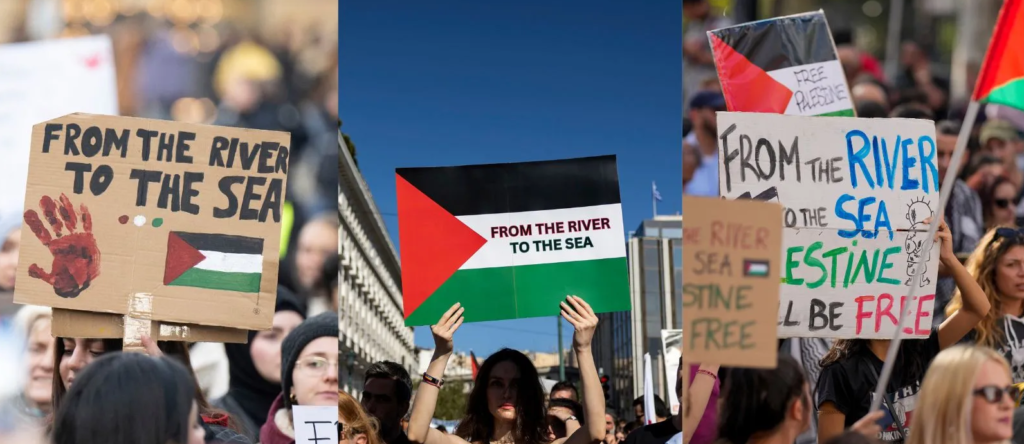Reflections on the Phrase “From the River to the Sea”

By: Paul Asfour / Arab America Contributing Writer
I’ve been thinking about the phrase “From the river to the sea, Palestine will be free.” Until the massacre of the people of Israel on October 7th, followed by the current, ongoing massacre of the people of Gaza, I accepted the common narrative that the phrase was understood to mean the elimination of the state of Israel. I’ve reflected on narratives, language, and words used in news reporting, statements from government officials, and activist voices, and current events that have challenged my perspectives.
I have changed my mind and now fully support and embrace the phrase “From the river to the sea, Palestine will be free.”
Here’s why?
Rejection of the phrase “From the river to the sea, Palestine will be free” implies ethnic cleansing of the Palestinian people.
If not between the Mediterranean Sea and the Jordan River, where would Palestinians be free? Are they meant to leave the region to be free?
Rejection of the phrase “From the river to the sea, Palestine will be free” implies a perpetual police state in which Palestinians will remain the prisoners.
Palestine, as recognized by international consensus, borders both the Mediterranean Sea and the Jordan River. Are people within those territories expected to continue to live as “not free” in perpetuity?
Rejection of the phrase “From the river to the sea, Palestine will be free” is a dehumanizing implication that Palestinians cannot speak about freedom without violent intent.
Jewish people and Americans should not be able to assume and dictate to Palestinians what they mean when they speak. It is offensive to tell people speaking about their aspirations for freedom and dignity that they mean something other than what they say they mean.
Rejection of the phrase “From the river to the sea, Palestine will be free” justifies continued occupation. It implies Palestinians should be apologetic about their desire for liberation and dignity. It implies that Palestinians cannot handle freedom and need to be controlled.
Palestinian people have the same right to self-determination and recognition of their history as Jews do. They can couch the terms of their freedom as they wish, the same as Jews or any other people do. The choice is not to silence people using the phrase but to question one’s motives for refusing to understand what they mean.
Rejection of the phrase “From the river to the sea, Palestine will be free” justifies confiscation of land and property under the guise of security. It also justifies the murder of countless civilians since 1948, the ongoing killing of Palestinians by “settlers,” who face minimal or no consequences, and the increasing function of Israel as a police state.
Jewish leaders in Israel openly call for and act on the very fear they claim for themselves: the expulsion of people from their land. The projection of their own intentions and actions onto people who use the phrase fosters a false narrative of Palestinian people as aggressors and Israeli Jews as the victims.
Rejection of the phrase “From the river to the sea, Palestine will be free” is racist. Although Israelis and Palestinians have many similarities, rejection of the phrase represents a perpetuation of the idea that Palestinians are nevertheless too savage to handle the same freedom as Jewish Israelis.
Israelis are highly educated. Israelis have a strong peace movement and have strong intellectual and political thinkers. Israelis also have embedded corruption in their government and extremist elements that have a higher proportional influence than they should have. Judaism is the practiced religion, but Israeli nationalism is largely a secular movement.
Palestinians are highly educated. (They have the highest level of higher education per capita than any other Arab country.) Palestinians have a strong peace movement and have strong intellectual and political thinkers. Palestinians also have embedded corruption in their government and extremist elements that have a higher proportional influence than they should have. Islam is the practiced religion, but Palestinian nationalism is largely a secular movement.
Words have an impact. When the listener hears a different meaning than what the speaker is saying, only conflict can ensue. People then operate on assumptions rather than mutual understanding. The modus operandi becomes defense and attack. It is unfortunate we (i.e., humans) are programmed this way. It takes effort and inquiry to overcome these instincts. Hopefully, we can begin to access our higher functions to better understand and respond when we hear the phrase.
I encourage users of the phrase to articulate that “From the river the sea, Palestine will be free” stands for liberation, self-determination, and dignity. I encourage Arab Americans and all people who value Western principles of freedom to use the phrase proudly and unapologetically.
Check out Arab America’s blog here!








